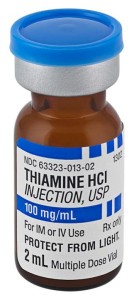Thiamine or B1 is a water soluble vitamin that is necessary for the conversion of nutrition into energy for brain and nerve function. Thiamine is also necessary for your body to carry oxygen to your cells primarily through your red blood cells. Thiamin deficiency is common among post bariatric surgery patients with frequent vomiting, blockages (strictures) or other impairments relating to nutritional intake regardless of the type of procedure performed. Patients should be monitored regularly to prevent vitamin deficiencies. Patients must be reminded to take their daily vitamins of appropriate type. Physicians must ensure that the patients are tolerating the vitamin supplements as these are sometimes hard for any person to tolerate.
Vitamins and minerals relying on fat metabolism, including vitamins D, A, E, K, and zinc, may be affected when absorption is impaired. The decrease in the length of the gastrointestinal tract may also result in secondary malabsorption of a wide range of micronutrients related to bypassing the duodenum and jejunum. Other micronutrient deficiency concerns reported for patients choosing a procedure with malabsorptive features include iron, calcium, vitamin B~12~, and folate.
Nutritional deficiencies after roux en y can result from either primary or secondary malabsorption or from inadequate dietary intake especially with complications of surgery. However, specific micronutrients appear to be malabsorbed postoperatively and present as deficiencies without adequate vitamin and mineral supplementation. Studies have shown that patients who have undergone gastric bypass have revealed predictable micronutrient deficiencies, including iron, vitamin B~12~ and folate. Case reports have also shown that thiamin deficiency can develop, especially when persistent postoperative vomiting or inadequate nutritional intake occurs.
deficiencies after roux en y can result from either primary or secondary malabsorption or from inadequate dietary intake especially with complications of surgery. However, specific micronutrients appear to be malabsorbed postoperatively and present as deficiencies without adequate vitamin and mineral supplementation. Studies have shown that patients who have undergone gastric bypass have revealed predictable micronutrient deficiencies, including iron, vitamin B~12~ and folate. Case reports have also shown that thiamin deficiency can develop, especially when persistent postoperative vomiting or inadequate nutritional intake occurs.
Food with high nutritional value such as meat and fibrous fresh fruits and vegetables might be poorly tolerated shortly after surgery. It is important for all members of the medical team to increase their awareness of the nutritional complications and challenges that lie ahead for the patient.
** Thiamin (vitamin B1)**
Beriberi is a thiamin deficiency that can affect various organ systems, including the heart, gastrointestinal tract, and peripheral and central nervous systems. In bariatric surgery patients is usually manifests itself as peripheral symptoms and changes in mental status including a decline in memory among other things. Although the condition is generally considered rare, a number of reported, and possibly a much greater number of unreported or undiagnosed cases, of beriberi have occurred among individuals who have undergone surgery for morbid obesity.
Early detection and prompt treatment of thiamin deficits in these individuals in absolutely necessary and can help to prevent serious health consequences. Low thiamine is a medical emergency and if not treated as such the deficiency can lead significant morbidity and mortality. If beriberi is misdiagnosed or goes undetected for even a short period, the bariatric patient can develop irreversible neuromuscular disorders, permanent defects in learning and short-term memory, coma, and even death. Because of the life-altering and potentially life-threatening nature of a thiamin deficiency, it is important that healthcare professionals in the field of bariatric surgery have knowledge of the etiology of the condition, and its signs and symptoms, treatment, and prevention.
**Etiology of potential deficiency **
We must take in nutrition that contains thiamine as the body does not make it. The total amount of thiamin in the body of an adult is approximately 30 mg, and it will be depleted in only 9–18 days if it is not replaced. Persistent vomiting, a diet deficient in the vitamin, or the body’s excessive utilization of thiamin use can result in a severe state of thiamin depletion within only a short period, producing symptoms of beriberi in the arms and legs, distal greater than proximal. Bariatric surgery increases the risk of beriberi through exacerbation of pre-existing thiamin deficits, low nutrient intake, malabsorption, and episodes of nausea and vomiting. Also being low on magnesium or being given glucose or dextrose in IV fluid can aggravate and make symptomatic an existing B1 deficiency. Chronic or acute thiamin deficiencies in bariatric patients often present with symptoms of peripheral neuropathy or Wernicke’s encephalopathy and Korsakoff’s psychosis.
Standard of Care Often Violated
Suffice it to say any changes in mental status and memory or peripheral symptoms should trigger immediate iv thiamine supplementation in a bariatric surgery patient. This supplementation should occur prior to the confirmation through lab work or otherwise of an actual B1 deficiency. This is the standard of care. This standard of care is often violated causing a delay in treatment and permanent injury or death. Early diagnosis of the signs and symptoms of these conditions is extremely important to prevent serious adverse health consequences. Even if treatment is initiated, recovery can be incomplete, with cognitive and/or neuromuscular impairments persisting long term or permanently.
The risk of the development of beriberi after bariatric surgery is far greater for individuals presenting for surgery with low thiamin levels. Multiple literature sources confirm that a range of 15 to 29% of preoperative bariatric patients had deficiencies in thiamin before surgery. The results of these studies suggested a need for preoperative thiamin testing, as well as thiamin repletion by diet or supplementation to reduce the risk of “bariatric” beriberi postoperatively.
Beriberi has been observed after gastric restrictive and malabsorptive procedures. A number of cases of Wernicke-Korsakoff syndrome (WKS), as well as peripheral neuropathy, have been reported for patients having undergone vertical banded gastroplasty. Many cases of injury from low B1 thiamine are believed to have occurred with bariatric procedures that have either not been reported or have been misdiagnosed because of limited knowledge regarding the signs and symptoms of acute or severe thiamin deficits. Because many foods are fortified with thiamin, beriberi has been nearly eradicated throughout the world, except for patients with severe alcoholism, severe vomiting during pregnancy (hyperemesis gravidarium), or those malnourished and starved. For this reason, few healthcare professionals, until recently, have had a patient present with beriberi. According to the published reports of thiamin deficits after bariatric procedures, most patients develop such deficiencies in the early postoperative months and most have had episodes of vomiting, surgical strictures (blockages), nausea and other oral intake issues. Malnutrition caused by a lack of appetite and dietary intake postoperatively also contributes to bariatric beriberi, as does noncompliance in taking postoperative vitamin supplements. Although most cases of beriberi occur in the early postoperative periods, cases of patients with severe thiamin deficiency more than one year after surgery have been reported. Some of the above references are from: https://asmbs.org/resources/integrated-health-nutritional-guidelines

Leave a Reply